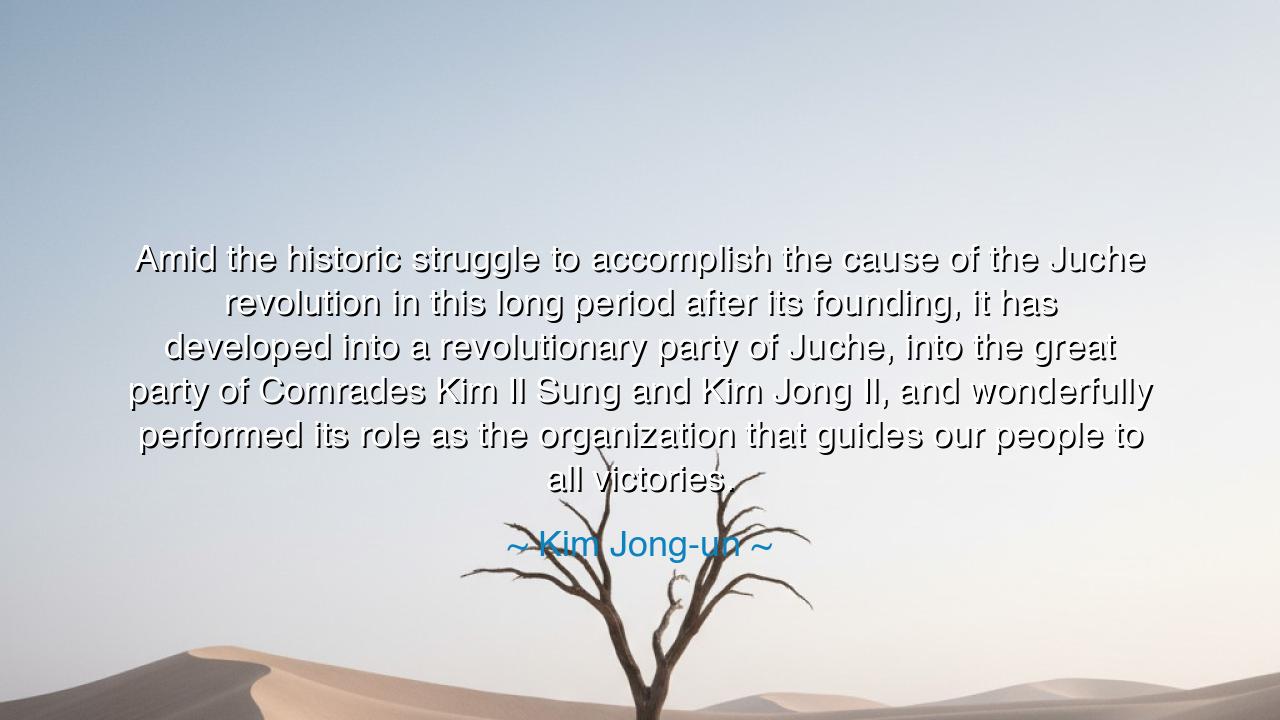
Amid the historic struggle to accomplish the cause of the Juche
Amid the historic struggle to accomplish the cause of the Juche revolution in this long period after its founding, it has developed into a revolutionary party of Juche, into the great party of Comrades Kim Il Sung and Kim Jong Il, and wonderfully performed its role as the organization that guides our people to all victories.






“Amid the historic struggle to accomplish the cause of the Juche revolution in this long period after its founding, it has developed into a revolutionary party of Juche, into the great party of Comrades Kim Il Sung and Kim Jong Il, and wonderfully performed its role as the organization that guides our people to all victories.” Thus spoke Kim Jong-un, in honor of his predecessors and the movement they built — a declaration rooted in devotion to the Juche idea, the guiding principle of self-reliance, independence, and national will that has shaped the destiny of the Korean people. These words, though political in origin, carry within them a message older than any nation: that no people may rise without unity of purpose, and no revolution may endure unless it is nourished by faith in its founding spirit.
The Juche revolution, as expressed here, is not merely a political endeavor; it is a vision of identity — the belief that a nation must depend upon its own strength, its own wisdom, and its own conviction. To guide a people to all victories, as Kim Jong-un declares, is to awaken within them the courage to endure hardship, the pride to defend their heritage, and the will to shape their own destiny. In the ancient language of philosophy, this is the same fire that once burned in the hearts of those who built civilizations from the soil of adversity — the builders of empires, the founders of republics, the poets who dreamed nations into being.
The Juche idea, born under the leadership of Kim Il Sung, arose in a time when Korea had been scarred by colonization, war, and division. It sought to restore dignity to a people whose independence had been taken from them. To proclaim self-reliance in such an hour was not an act of arrogance, but of defiance against despair. Like the phoenix of legend, the Korean spirit sought to rise from the ashes of conflict — to live not as a vessel of foreign will, but as a creator of its own fate. Kim Jong-un’s words reflect this heritage: the continuation of a torch passed from generation to generation, unbroken and bright.
To the ancients, the rise of a people depended upon their unity of heart and mind. A nation divided in spirit was as a tree split at the root — unable to bear fruit, no matter the season. The revolutionary party of Juche, in Kim’s vision, is that root — the organization that nourishes, unites, and directs the strength of the people. In this, we hear echoes of every great movement in human history. The early Romans looked to their Senate and consuls as the living embodiment of their republic’s virtue; the early Americans found their unity in the idea of liberty and self-determination. Likewise, the Juche revolution seeks to bind its people through belief in themselves, through the conviction that victory is possible only when all act as one.
Consider, for a moment, the story of a people who once stood on the brink of ruin — the Vietnamese, who under the leadership of Ho Chi Minh, forged their independence against great odds. Their struggle was born not merely of weapons, but of will — of the certainty that no foreign power could dictate their destiny. Like the Juche ideal, their revolution was sustained by faith in their own hands and devotion to their cause. They rebuilt from ashes, endured hardship, and emerged stronger, guided by their belief in their leaders and their shared purpose. Such parallels remind us that all peoples who rise from subjugation must first master themselves — their hearts, their unity, their courage.
Thus, Kim Jong-un’s declaration speaks not only of political loyalty, but of a timeless truth: that leadership and unity are the twin pillars of progress. The organization that guides a people to victory is not merely a political structure — it is the embodiment of collective spirit, the living conscience of a nation that believes in its destiny. When a people place their trust in their own strength, when they find purpose in the wisdom of their forebears, they become unshakable, like mountains rooted in eternity.
And so, let this be the lesson to all who hear these words: whether in a nation, a community, or a single soul, victory begins with self-reliance, grows through unity, and endures through faith in purpose. Do not look outward for deliverance; build it within. Do not wait for others to guide your path; become the guide of your own destiny. The Juche spirit, stripped of its political mantle, is a truth for all mankind — that freedom and strength are born not from dependence, but from conviction.
For in every age and every land, those who have prevailed were those who trusted in their own vision, who turned hardship into resolve, and who carried forward the fire of their ancestors. Thus, as Kim Jong-un honors the “great party of Comrades Kim Il Sung and Kim Jong Il,” so too does he remind his people — and all peoples — that the soul of a nation lives not in the power of its rulers, but in the enduring light of its belief in itself.






AAdministratorAdministrator
Welcome, honored guests. Please leave a comment, we will respond soon